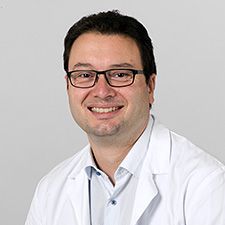The systemic or drug treatment of pancreatic cancer primarily involves systemic chemotherapy. Immunotherapies and therapies with molecularly targeted substances have so far mainly been used in studies and specific individual cases.
Chemotherapy
Chemotherapy plays a central role in the treatment of pancreatic cancer.
If there is no distant metastasis and the tumor can be surgically removed (operable), the treatment goal is complete cure. However, relapse rates are extremely high with surgery alone (in the range of >90%). All pancreatic carcinomas are therefore additionally treated with chemotherapy if possible, as chemotherapy reduces the recurrence rate. If a pancreatic carcinoma is operable, surgery is often performed first and, after recovery from the operation, chemotherapy with 12 cycles (24 weeks) of FOLFIRINOX, a combination of several chemotherapy infusions, is administered. The choice and dosage of chemotherapeutic follow-up treatment is adjusted according to the age and general condition of the patient. If a pancreatic tumor without distant metastases is still inoperable (“locally advanced”) or cannot be completely removed (“borderline resectable”), chemotherapy is given first and surgery is performed later if there is a good response. More and more frequently, even operable tumors are now initially treated with chemotherapy for 3 months, as there are indications that this has advantages with regard to the overall course of the disease.
Pancreatic cancer is a very aggressive cancer and in about half of all patients, distant metastases can be detected at the time of initial diagnosis. In this situation, a cure is usually no longer possible and disease control and prolongation of life with the best possible quality of life are the most important treatment goals. Surgery only plays a very rare role in the metastatic stage; radiotherapy is used if necessary to alleviate symptoms. In the metastatic stage of the disease, we carry out extensive molecular diagnostics from the tumor tissue in order to adapt the treatment to the tumor and patient as well as possible. Chemotherapy is the main treatment for metastatic pancreatic cancer. Immunotherapy and molecularly targeted therapies have so far only been effective in a small number of patients who can be identified by molecular testing.
Targeted therapies
Molecularly targeted therapies are either antibodies that are administered as an infusion and bind highly specifically to the surface of cancer cells or smaller molecules that are taken in tablet form, penetrate the cancer cells and interrupt metabolic processes. In 95% of cases, pancreatic cancer is caused by an activating gene mutation in the KRAS cancer gene. KRAS blockers are currently only available for a single mutation that rarely occurs in pancreatic cancer (KRAS-G12C, approx. 3% of all pancreatic cancers). Antibodies are also not effective in pancreatic cancer. Overall, only up to 10% of all pancreatic cancers can be treated with targeted therapy. We carry out molecular tests on all patients to uncover these and also offer studies that test new approaches and substances in the treatment of pancreatic cancer.
Immunotherapy
To date, cancer immunotherapies have only been effective in a very small proportion of all pancreatic cancers (<1%). We identify these rare cases by molecular tumor testing. However, there are currently many therapy studies worldwide that are testing new immunotherapy strategies and immunochemotherapy combinations in patients with pancreatic cancer. The USZ also frequently offers study inclusion opportunities for patients with pancreatic cancer.
Liver and Pancreas Tumor Center
At the Liver and Pancreatic Tumor Center, we offer the entire spectrum of screening, diagnostics, treatment and aftercare for liver and pancreatic cancer at all stages.


